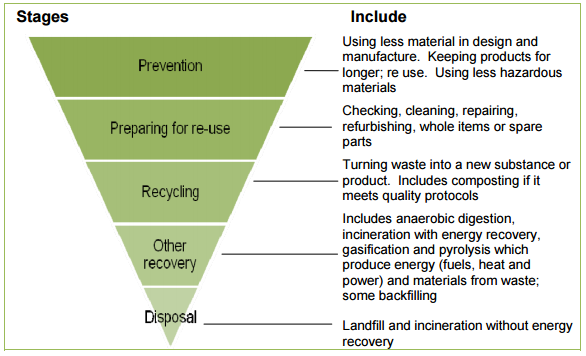Improving awareness of legislation will help your organisation to practice and demonstrate compliance in storage and disposal of waste.
Key waste legislation
Waste should be handled and stored safely and securely in suitable, clearly labelled containers that prevent leakage, contamination or spoiling in accordance with Waste Duty of Care Code of Practice.

The Duty of Care regulations are imposed under section 34 of the Environmental Protection Act 1990, failure to comply with the duty of care is an offence subject to an unlimited fine on conviction.
The Waste (England and Wales) Regulations 2011 require your business and waste contractor to confirm that the waste hierarchy has been applied. The waste hierarchy ranks waste management treatment options, giving priority to waste prevention.
When dealing with hazardous waste, that is at higher risk of being harmful to the environment or human health, consider the Hazardous Waste Regulations 2005.
Legislation in Wales
The Welsh Government has power to pass its own waste laws, that underpin the implementation of the Wales Waste Strategy – Towards Zero Waste and Beyond Recycling
There is a legal requirement for the separate collection of recycling (paper, glass, plastic and metal), and this should be discussed with your organisation’s waste and recycling contractor. The Environmental (Wales) Act includes the legal requirement for separate collections, which are technically, environmentally or economically practicable; otherwise known as TEEP obligations. Separating out materials so that they can be diverted from landfill disposal towards high quality recycling or recovery can result in reduced costs and positive results for the economy as well as the environment. Separate collection ensures that materials which could be recycled are not wasted. This is particularly important for food waste that can be used as a source of renewable energy to power businesses and homes, and as high quality fertiliser.
In 2023 Wales is expected to fully implement the provisions of the Environment (Wales) Act related to waste, that will further improve waste management processes by helping to achieve higher levels of business waste recycling, better food waste treatment and increased energy recovery. The Act will operate in conjunction with landfill bans to ensure that valuable materials are recycled. This will help to decrease pressure on natural resources while also contributing towards positive results for both the economy and the environment. The Environment (Wales) Act 2016 became law in Wales on 21st March 2016.
More information about the Act can be found at Assembly Wales.
There are 7 parts for the Environment (Wales) Act. Part 4 of the Act has a specific focus on segregation and collection. Further information can be found in the Environment (Wales) Act 2016: factsheets.
Making improvements to the current methods of waste management through the Act provides greater certainty for investment in recycling, waste collection and treatment infrastructure.
This will result in:
- saving costs to businesses through avoided landfill tax
- increasing business competitiveness by reducing material costs
- increasing employment by creating jobs in collection and reprocessing
- supporting increased opportunities for the generation of renewable energy from business waste
- giving greater security of supply of resources to our manufacturing sector
- helping drive green growth and develop a ‘circular economy’ for Wales through the use by Welsh manufacturing businesses of recyclable materials collected in Wales
- reducing greenhouse gas emissions
- reducing the ecological footprint of Wales
Implement an Environmental Management System (EMS)
An Environmental Management System can clarify responsibilities for all staff to reduce environmental impact and remain compliant with legislation. There are several approaches to implementing a formal EMS. You can develop your own system in-house, follow the guidelines of the International Standard (ISO 14001), the EC’s Eco-Management and Audit Scheme (EMAS) or the British Standard (BS 8555) for small and medium sized businesses.
